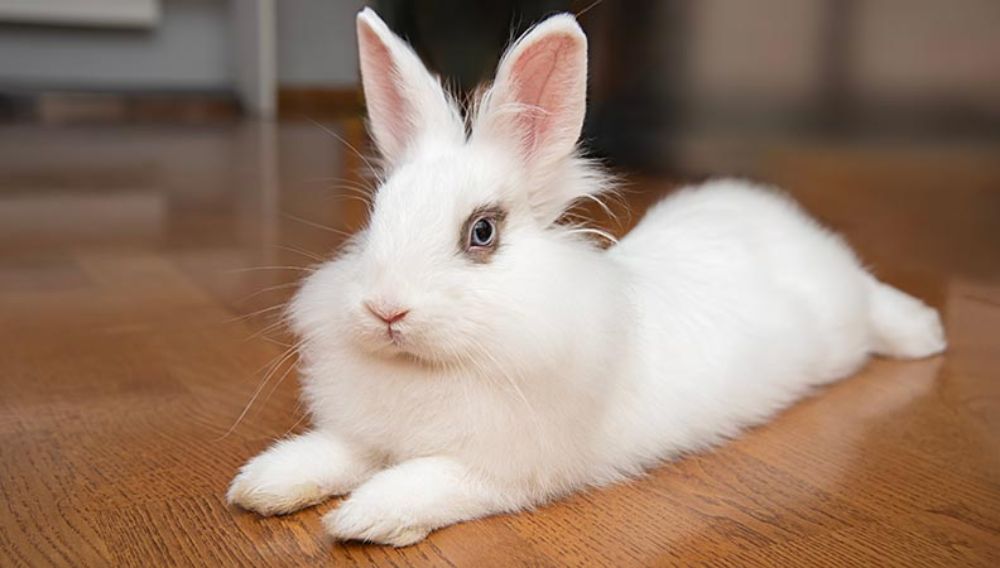
The hock area is part of your rabbits back foot. Sore rabbit hocks (pododermatitis) can be a common problem, but it’s usually a problem that can be avoided by making sure your rabbit has plenty of clean, dry and comfortable space to move around in.
If you want to know more about rabbit sore hocks, or have questions such as how do rabbits get sore hocks? Can sore hocks kill rabbits? And how to treat sore hocks in rabbits, then read on…
What Are Sore Hocks in Rabbits? (Pododermatitis)
Pododermatitis is just a fancy way of saying “inflamed foot”. Pododermatitis is essentially a pressure sore. Inflammation occurs on the bottoms of their feet, where they make contact with the ground, and there is pressure on the hock.
Bacteria can gain access via the damaged skin and affect other tissues, including tendons and can even cause incredibly painful bone infections. Ulcerative pododermatitis is the name used when the skin has been broken or damaged.
What Causes Sore Hocks in Rabbits?
The back feet are usually affected, since they support the majority of the rabbit's weight, though the front feet can also be affected. Any situation that increases the pressure on any part of the rabbit’s foot is a risk factor for pododermatitis.
Giant breeds (such as the British Giant Rabbit) are more at risk of developing sores as they’re heavier and the same applies to overweight or pregnant inactive rabbits.
Poor conformation, a spine issue or leg injury may lead to increased weight-bearing on a specific foot. Pain, such as arthritis, may lead to the rabbit not moving evenly and weightbearing abnormally.
Elderly rabbits that become inactive may bear weight abnormally. If claws become overgrown then the rabbit will bear more weight on the back of the feet, increasing the risk of
Grooming Your Rabbits' Feet
Other factors may also increase the risks, like removal of the thick fur, by shaving or clipping, from the base of the feet removes protection.
Rex rabbits have less skin protection than other breeds due to their lack of guard hairs and thinner coat. Abrasive or wire flooring may damage feet and increase the risks of infection.
Wet or soiled bedding/litter and poor hygiene results in wet skin, which is more likely to be damaged or breached by bacteria.
Is Pododermatitis Painful to Rabbits?
Pododermatitis is painful, but rabbits are masters at hiding their discomfort. Look out for signs such as reluctance to move, reduced appetite, teeth grinding, depression or aggressive behaviour.
Pain due to tissue damage and infection can lead to less mobility and a vicious cycle in which the condition worsens. Left untreated this condition may be fatal. Pain can lead to anorexia and gut problems and if infection spreads to the rest of the body, then sepsis may occur. Any rabbit with sore hocks should receive veterinary care ASAP.
Sore Hocks Treatment
It’s essential to identify and address any underlying causes, especially with regards to clean and dry, soft bedding. Affected rabbits need to be properly cared for and need lots of TLC.
- Diet: Provide an appropriate diet with supportive feeding if need be. Your vet can advise you regarding feeding, especially if your rabbit needs to lose weight – as this must be done very carefully to avoid gastrointestinal and liver problems.
- Nail clipping: Regular nail trims are essential, and your veterinary team can assist with these until you feel confident to do them yourself.
- Foot care: Feet must be clean and dry.
- Ointment: Your vet may provide topical ointments for you to apply at home. Some rabbits may benefit from dressings, although many rabbits won't tolerate them.
- Pain medication: Pain medication is essential so if you struggle to get your rabbit to take this, ask your vet for help. Pain can cause rabbits to have life-threatening gut problems, so it’s important to get this medicine into them.
Open sores can become infected and may require antibiotics. In severe cases of rabbit hock sores, treatment may even include surgery to address deeper disease.
How to Prevent Sore Hocks in Rabbits
To reduce the risk, clean any soiled/wet litter daily and encourage exercise. Ensure that your rabbit has a good, veterinary approved diet and an appropriate environment in which to live so that they're not overweight and have healthy bowels.
Avoid improper flooring, hard or abrasive surfaces in your rabbit's environment. Do not clip the fur from the hocks. Try to avoid stressing your rabbit as nervous rabbits traumatise their back feet when they stamp!
Check Their Feet for Signs of Pododermatitis in Rabbits
Check your rabbit’s feet regularly, so that you spot any problems as early as possible.
Hock sores can be a very serious condition in pet rabbits. However, it’s usually possible to prevent sore hocks by ensuring excellent attention to keeping rabbit enclosures, clean and dry and ensuring rabbits have lots of space to run around and explore.
If sore hocks do occur, then prompt veterinary treatment is essential and improvements to their environment should be quickly considered. If caught early, then it’s possible to treat sore hocks. Talk to your veterinary team if you have any worries about rabbit hock sores.
Everypaw Rabbit Insurance
Here at Everypaw, we want to help you keep your bunny healthy and in tip top shape. So, when it comes to your rabbit’s care, Everypaw’s Rabbit Insurance could be just the cover to look after your little thumper.
Content provided from Vetstream's Vetlexicon Lapis - www.vetlexicon.com/lapis
Vetlexicon is the world’s largest peer-reviewed online clinical reference source. All our content is written and peer-reviewed by over 1,000 of the world’s leading veterinarians, ensuring relevance, accuracy and quality.
- Vetstream Ltd & McKeever F (online) Ulcerative pododermatitis (Bumble foot) In: Vetlexicon Lapis. Vetstream Ltd, UK. Website: https://www.vetlexicon.com/lapis/dermatology/articles/ulcerative-pododermatitis-bumble-foot/